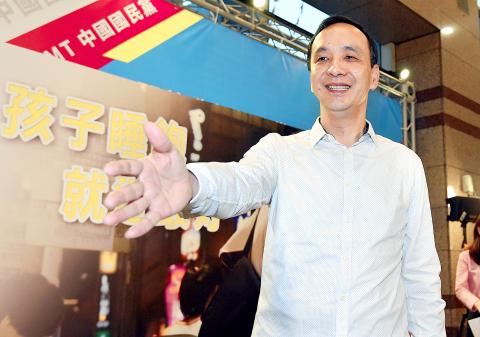Chinese Nationalist Party (KMT) Chairman Eric Chu’s (朱立倫) justification for replacing Deputy Legislative Speaker Hung Hsiu-chu (洪秀柱) as the party’s presidential candidate does not seem to hold water, as he appears to be even more unpopular than Hung among pan-blue supporters, a survey released yesterday showed.
The poll, conducted by Taiwan Indicators Survey Research on Monday and Tuesday, showed that nearly 57 percent of respondents feel unfavorably toward Chu, with only 24 percent saying they had a good impression of the KMT chairman.
That compares with a similar poll carried out by the research group last month — when Hung was still the KMT’s candidate — with 52 percent of respondents expressing their disfavor of the deputy legislative speaker, while 30 percent supported her.

Photo: Liao Chen-huei, Taipei Times
Chu, who has been hailed by most KMT members as the party’s only hope of continuing its reign, also received a higher disapproval rating of 22.1 percent among respondents identified as pan-blue than Hung, who garnered 17.3 percent in last month’s survey.
The results indicate that the aftermath of the KMT’s controversial move on Oct. 17 to force Hung out of the Jan. 16 presidential race and nominate Chu instead continues to take a toll on the chairman’s election prospects, the survey center said.
The results also undercut the KMT’s rationale behind removing Hung, which cited her consistently lackluster support ratings, which the party said could jeopardize its legislative majority, as well as her pro-unification policies, which it said strayed from the party’s cross-strait stance.
Asked who they plan to vote for in the presidential election, 47.1 percent of respondents said they would support Democratic Progressive Party (DPP) presidential candidate Tsai Ing-wen (蔡英文), 16.4 percent said they favored Chu and 10.2 percent preferred People First Party (PFP) challenger James Soong (宋楚瑜). Thirteen percent said they would abstain from voting, while 13.4 percent declined to express an opinion.
It is worth noting that Chu’s support rating was close to that of Hung — at 15.6 percent in a survey released on Oct. 15 — before she was edged out by her own party.
As for their perception about major political parties in Taiwan and China, 42 percent of those polled had a good opinion of the DPP, compared with 21.6 percent for the KMT and 13.7 percent for the Chinese Communist Party.
The poll collected 1,004 valid samples from residents aged 20 or above across the nation. It has a confidence level of 95 percent and a margin of error of 3.1 percentage points.

Seventy percent of middle and elementary schools now conduct English classes entirely in English, the Ministry of Education said, as it encourages schools nationwide to adopt this practice Minister of Education (MOE) Cheng Ying-yao (鄭英耀) is scheduled to present a report on the government’s bilingual education policy to the Legislative Yuan’s Education and Culture Committee today. The report would outline strategies aimed at expanding access to education, reducing regional disparities and improving talent cultivation. Implementation of bilingual education policies has varied across local governments, occasionally drawing public criticism. For example, some schools have required teachers of non-English subjects to pass English proficiency

‘FORM OF PROTEST’: The German Institute Taipei said it was ‘shocked’ to see Nazi symbolism used in connection with political aims as it condemned the incident Sung Chien-liang (宋建樑), who led efforts to recall Democratic Progressive Party (DPP) Legislator Lee Kun-cheng (李坤城), was released on bail of NT$80,000 yesterday amid an outcry over a Nazi armband he wore to questioning the night before. Sung arrived at the New Taipei City District Prosecutors’ Office for questioning in a recall petition forgery case on Tuesday night wearing a red armband bearing a swastika, carrying a copy of Adolf Hitler’s Mein Kampf and giving a Nazi salute. Sung left the building at 1:15am without the armband and apparently covering the book with a coat. This is a serious international scandal and Chinese

TRADE: The premier pledged safeguards on ‘Made in Taiwan’ labeling, anti-dumping measures and stricter export controls to strengthen its position in trade talks Products labeled “made in Taiwan” must be genuinely made in Taiwan, Premier Cho Jung-tai (卓榮泰) said yesterday, vowing to enforce strict safeguards against “origin laundering” and initiate anti-dumping investigations to prevent China dumping its products in Taiwan. Cho made the remarks in a discussion session with representatives from industries in Kaohsiung. In response to the US government’s recent announcement of “reciprocal” tariffs on its trading partners, President William Lai (賴清德) and Cho last week began a series of consultations with industry leaders nationwide to gather feedback and address concerns. Taiwanese and US officials held a videoconference on Friday evening to discuss the

PERSONAL DATA: The implicated KMT members allegedly compiled their petitions by copying names from party lists without the consent of the people concerned Judicial authorities searched six locations yesterday and questioned six people, including one elderly Chinese Nationalist Party (KMT) member and five KMT Youth League associates, about alleged signature forgery and fraud relating to their recall efforts against two Democratic Progressive Party (DPP) legislators. After launching a probe into alleged signature forgery and related fraud in the KMT’s recall effort, prosecutors received a number of complaints, including about one petition that had 1,748 signatures of voters whose family members said they had already passed away, and also voters who said they did not approve the use of their name, Taipei Deputy Chief Prosecutor